This presentation stems from two workshops held at the SAES (Société des anglicistes de l’enseignement supérieur) Congress in Borde aux in 2009 and ESSE, European English Studies Society conference in Turin, in August 2010, at which international scholars in English Studies and Social and Cultural History convened.
aux in 2009 and ESSE, European English Studies Society conference in Turin, in August 2010, at which international scholars in English Studies and Social and Cultural History convened.
The French workshop organised under the aegis of the CRECIB (Centre de recherches en civilisation britannique) entitled Essais : L’expérimentation sociale et politique outre-Manche), was jointly convened and chaired by Jean-Paul Revauger (Bordeaux 3), Susan Finding (Poitiers), Myriam Boussabha-Bravard (Paris VII), and the late François Poirier (Paris XIII).
The workshop in Italy, Alternative Lifestyles, Society and Politics, was chaired by Mario Avelar (Universidad Aberta, Portugal), Logie Barrow (Bremen, Germany) and Susan Finding (Poitiers, France).
Full abstracts of the papers submitted to both conferences can be found below.
The theme has been taken up in France in American Studies under the title : 2 – Révoltes et utopies : la contre-culture américaine des années soixante.
Alternative Lifestyles, Society and Politics
 One day this summer I was riding through Letchworth when the bus stopped and two dreadful-looking old men got on to it. They were both about sixty, both very short, pink, and chubby, and both hatless. One of them was obscenely bald, the other had long grey hair bobbed in the Lloyd George style. They were dressed in pistachio-coloured shirts and khaki shorts into which their huge bottoms were crammed so tightly that you could study every dimple. Their appearance created a mild stir of horror on top of the bus. The man next to me, a commercial traveller I should say, glanced at me, at them, and back again at me, and murmured ‘Socialists’, as who should say, ‘Red Indians’. He was probably right-—the I.L.P. [Independent Labor Party] were holding their summer school at Letchworth. But the point is that to him, as an ordinary man, a crank meant a Socialist and a Socialist meant a crank. Any Socialist, he probably felt, could be counted on to have something eccentric about him. And some such notion seems to exist even among Socialists themselves. For instance, I have here a prospectus from another summer school which states its terms per week and then asks me to say ‘whether my diet is ordinary or vegetarian’. They take it for granted, you see, that it is necessary to ask this question. This kind of thing is by itself sufficient to alienate plenty of decent people. And their instinct is perfectly sound, for the food-crank is by definition a person willing to cut himself off from human society in hopes of adding five years on to the life of his carcase; that is, a person out of touch with common humanity.
One day this summer I was riding through Letchworth when the bus stopped and two dreadful-looking old men got on to it. They were both about sixty, both very short, pink, and chubby, and both hatless. One of them was obscenely bald, the other had long grey hair bobbed in the Lloyd George style. They were dressed in pistachio-coloured shirts and khaki shorts into which their huge bottoms were crammed so tightly that you could study every dimple. Their appearance created a mild stir of horror on top of the bus. The man next to me, a commercial traveller I should say, glanced at me, at them, and back again at me, and murmured ‘Socialists’, as who should say, ‘Red Indians’. He was probably right-—the I.L.P. [Independent Labor Party] were holding their summer school at Letchworth. But the point is that to him, as an ordinary man, a crank meant a Socialist and a Socialist meant a crank. Any Socialist, he probably felt, could be counted on to have something eccentric about him. And some such notion seems to exist even among Socialists themselves. For instance, I have here a prospectus from another summer school which states its terms per week and then asks me to say ‘whether my diet is ordinary or vegetarian’. They take it for granted, you see, that it is necessary to ask this question. This kind of thing is by itself sufficient to alienate plenty of decent people. And their instinct is perfectly sound, for the food-crank is by definition a person willing to cut himself off from human society in hopes of adding five years on to the life of his carcase; that is, a person out of touch with common humanity.
George ORWELL, The Road to Wigan Pier, 1937, Chapter 11.
It is not a coincidence that left-wing politics and alternative lifestyles were sometimes synonymous, as George Orwell remarked in The Road to Wigan Pier (1937): ‘ ‘Socialism’ and ‘Communism’ draw towards them with magnetic force every fruit-juice drinker, nudist,
sandal-wearer, sex-maniac, Quaker, ‘Nature Cure’ quack, pacifist, and feminist in England.’ It was however rather schematic of Orwell to reduce the alternatives disparagingly to such a hotch-potch, and indeed to exclude excentric, marginalized lifestyles which are more associated with right-wing propensities. Opposition to
majority values, attempts to develop lifestyles not in keeping with dominant mores, revolt against the silent and consensual majority, consumerism and materialism, are not an invention of the 1930s and even less of the 1960s, although the rediscovery of leading lights of alternative lifestyles such as Oscar Wilde or Edward Carpenter, or further back, the Diggers, dates from that latter period, rich in new developments and reaffirmations.
Themes and issues to be discussed include: the nature of these alternatives: the political rejection of hierarchy, of elites, of the established order, reversing traditions, the non-violent aspect of this opposition; the types of projects and protests such as urban experiments, opposition to urban developments, new communities, communal
living; mass squats such as Greenham Common, peace protests; the philosophy and culture of these movements: counter-culture, mysticism, eg. New Ageism, vegetarianism.
Can these different movements be categorized according to degrees of realism, pragmatism, idealism, escapism? What social and political basis do/did they offer? What are/were the links between the political sphere and these alternative movements? How far is the agenda of traditional party politics modified by such initiatives and has the political establishment resisted or succumbed to new themes, new practice and new ideas inspired by these movements?
In Bordeaux, the papers given covered Bohemian lifestyles, forms of family life and sexual attachment, and community living, the rethinking of the sexual order and revolt against sexual exclusion and marginalization : feminists, homosexuals, new marriages, new ‘men’ who supported the claims and demands of women militants. The historical perspective of some of the papers covering the 17th, 18th and 19th centuries, are reminders that such ‘discoveries’ are not restricted to the late 20th century.
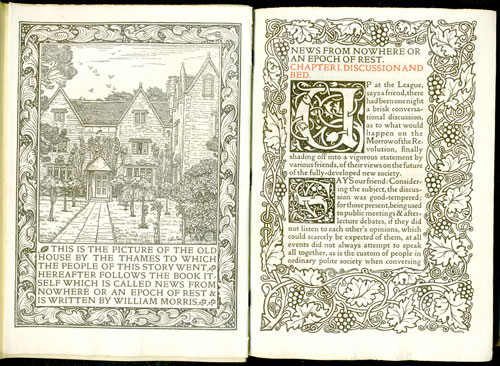 William Morris (News from Nowhere, 1890) and Frederick Engels (Socialism: Scientific and Utopian, 1880) specifically appeared to adhere to the idea that a u-topia was, by definition, unattainable, illusive, stemming from impractical day-dreaming. And yet how many of these social experiments were rooted in practical and pragmatic communities practising what they preached? Apart from the more well-known utopian socialist attempts conducted by Owen or Fourier in the 19th century, latter daybco-operatives (Currelly, Fleurot), the establishment of the free state in Sierra Leone (‘Les échecs de la colonie d’affranchis en Sierra Leone, 1787-1807’, paper given at Bordeaux by the late François Poirier, Université de Paris 13) or the CAT community in Wales (Bory) provide striking examples.
William Morris (News from Nowhere, 1890) and Frederick Engels (Socialism: Scientific and Utopian, 1880) specifically appeared to adhere to the idea that a u-topia was, by definition, unattainable, illusive, stemming from impractical day-dreaming. And yet how many of these social experiments were rooted in practical and pragmatic communities practising what they preached? Apart from the more well-known utopian socialist attempts conducted by Owen or Fourier in the 19th century, latter daybco-operatives (Currelly, Fleurot), the establishment of the free state in Sierra Leone (‘Les échecs de la colonie d’affranchis en Sierra Leone, 1787-1807’, paper given at Bordeaux by the late François Poirier, Université de Paris 13) or the CAT community in Wales (Bory) provide striking examples.
In Turin, the workshop debates centered on three main points common to the case studies presented in the papers given : community, capitalism and evangelicalism. The communitarian aspect of the cooperative movement in Britain (Fleurot) which offered common facilities to members, provided a practical alternative social organisation. The practical nature of the Centre for Alternative Technology in Wales (Bory), which started as a communal living experience in 1973, shared a moralising aspect which verged on evangelicalism. The case studies examined demonstrated a model which associated pragmatism and idealism to differing degrees. All the examples were attempts to make a dream become a reality, from u-topia to a topia or settlement.
They were all to various degrees reactions to the individualistic lifestyles imposed by capitalism whether they be collectivists in the broad sense of the term or reactionary conservatives, rejecting globalisation (Ben Barka). For many this was a kind of ‘functional socialism’ in Habermas’ definition (Berg) adopting practical individual action rather than adhering to total ideological and political change. From the self-governing, self-sufficient community and ‘radical localism’ to the excentric individual, preaching self-fulfilment through sex (Arcana), all sought to stave off the mainstream lifestyle brought about by the relations capitalism had developed between master and worker, between producer and consumer. However this self-preservation brought with it self-marginalisation, isolation and rejection by the mainstream society in which they lived.
The abstracts below are arranged in a loosely thematic and chronological order and a selected bibliography follows.
« Our digging upon the Common is the talk of the whole Land » : l’expérimentation sociale des « Diggers » du Surrey vue par la presse des années 1649-1650.
Laurent CURELLY, Université de Haute Alsace – Mulhouse
Le 9 juin 1649, dans une lettre adressée au Général en chef Fairfax, dirigeant de facto de la République nouvellement proclamée, le meneur des « Diggers » du Surrey, Gerrard Winstanley, évoque, de manière quelque peu hyperbolique toutefois, l’écho qu’aurait rencontré la mise en place de sa communauté agraire de St George’s Hill. Ce mouvement protestataire, composé pour l’essentiel d’ouvriers agricoles et d’artisans qui revendiquaient pour le peuple l’accès aux terrains communaux et leur mise en culture, s’efforça pendant environ une année d’expérimenter et de promouvoir un communisme agraire. Bien que relativement marginaux, les « Diggers » et leur chef Winstanley, mus par une vision millénariste des événements révolutionnaires qui affectaient l’Angleterre, croyaient en une régénération spirituelle de l’être dont le préalable était l’appropriation collective de la terre et l’arasement des inégalités sociales. Ils pouvaient à cet égard inquiéter l’establishment politique d’une République qui, selon eux, ne tenait pas toutes se promesses. En tout cas, leur entreprise amena Fairfax à prendre l’initiative de rencontrer Winstanley à plusieurs reprises.
Il s’agira ici d’étudier l’image que donna de l’expérimentation sociale menée par les « Diggers » du Surrey la presse des années 1649-1650. On mettra notamment en lumière le point de vue développé dans les « newsbooks » sur les relations qu’entretinrent Winstanley et ses compagnons avec les autorités de la République. Dans une perspective chronologique, on s’attachera à la façon dont la presse rendit compte des événements liés à l’expérience des « Diggers », de l’occupation de St George’s Hill au printemps 1649 à leur départ forcé pour Cobham durant l’été 1649 puis à leur dispersion au printemps suivant, alors que les thèses qu’ils défendaient s’étaient nettement radicalisées. On s’efforcera de proposer une typologie de ces regards journalistiques sur les « Diggers » relativement à l’orientation politique des publications.
Co-operatives, Fair Trade and Utopian Socialism: When Dreams and Pragmatism Coalesce.
Magali FLEUROT, Université de Bordeaux III
When cooperatives started to get organised, they had no claim at changing people’s lives on a personal level as there was no question of living together but it was a definite alternative as it offered a different way of looking at human relationships. This paper will examine how much of the nineteenth-century Socialist experiments can be found in today’s initiatives of cooperatives and fair trade. The word ‘utopia’ and its implications outside the literary world will also have to be questioned. Thereby, the ideas of utopian socialists may not be as unpractical as they were once thought to be.
Exemple de révolte contre le mode de vie consensuel de l’Angleterre du XIXème siècle : les pionnières des métiers de l’horticulture.
Emily CORVISY, Grenoble III
De nombreuses femmes ont commencé, de diverses façons, à influencer l’art des jardins anglais aux époques victorienne et édouardienne. A partir de 1890, alors que ces dernières sont tenues à l’écart de toutes les réalités de la sphère publique, les femmes se voient offrir, dans quelques écoles spécialisées, la possibilité d’être formées aux différents métiers liés au jardinage.
Ces écoles ont été créées par des pionnières excentriques dont le souci premier est d’aider ce « million de surplus de femmes anglaises » à s’assumer financièrement. La réalisation du projet de ces femmes se développera non sans rencontrer de multiples oppositions de la part de la communauté masculine (scientifique et professionnelle). La mise en pratique de cette tentative d’émancipation du rôle des femmes est reçue par les tenants des valeurs dominantes comme une forme de révolte. Néanmoins, dès 1896, certains propriétaires terriens ou conservateurs de jardins botaniques, tel que William  Thistleton-Dyer à Kew, emploient de jeunes apprenties nouvellement instruites dans ces écoles féminines d’horticulture. Au début du XXème siècle l’accès à l’ensemble des métiers liés au jardinage sera ouvert aux femmes. Les postes au sommet de la hiérarchie professionnelle, tel que celui de paysagiste, seront dorénavant accessibles aux femmes dont la représentante emblématique et symbolique est Gertrude Jekyll.
Thistleton-Dyer à Kew, emploient de jeunes apprenties nouvellement instruites dans ces écoles féminines d’horticulture. Au début du XXème siècle l’accès à l’ensemble des métiers liés au jardinage sera ouvert aux femmes. Les postes au sommet de la hiérarchie professionnelle, tel que celui de paysagiste, seront dorénavant accessibles aux femmes dont la représentante emblématique et symbolique est Gertrude Jekyll.
Le mouvement des cités-jardins et la question urbaine en Grande-Bretagne. Une tentative inaboutie ?
David FEE, Université Paris 3- Sorbonne Nouvelle
On mesure souvent mal ce que la société britannique contemporaine doit au mouvement des cités-jardins. De ce mouvement, né en 1898 avec la
publication de Tomorrow : A Peaceful Path to Real Reform de Ebenezer Howard, dont le grand public n’a retenu que la théorie des villes à la campagne, on connait parfois les deux réalisations anglaises de Letchworth et Welwyn. On sait moins souvent que cet essai, influencé par certains mouvements radicaux de la fin du 19ème siècle, pour transformer la société britannique et remédier aux maux urbains qui découlaient de près d’un siècle de révolution industrielle, a contribué à façonner le visage de la Grande-Bretagne moderne. Car en dépit d’un échec relatif pendant les décennies qui ont suivi sa création (deux cités-jardins édifiées seulement ; un attrait limité à une catégorie étroite de la population, dépeinte comme bohème par ses détracteurs), certains des principes urbanistiques qui sous-tendent la théorie du mouvement ont été détournés après la première guerre mondiale et repris à leur compte par les autorités politiques nationales afin de calmer l’agitation sociale et éviter une révolution en Grande-Bretagne. Ils ont ainsi contribué à engendrer et dessiner la banlieue (suburbia), espace urbain indissociable de l’identité britannique et paradoxalement antithèse du mouvement. Ils ont alimenté la réflexion des dirigeants nationaux, après la seconde guerre mondiale cette fois, et contribué à une autre invention britannique, dont l’influence était appelée à être aussi forte, les villes nouvelles (New Towns). C’est à ces théories que des millions de Britanniques doivent aujourd’hui leurs conditions de vie et que la Grande-Bretagne doit son visage et son système d’aménagement du territoire.
Cette communication se propose donc d’étudier les théories du mouvement des cités-jardins, ses sources, ainsi que ses réalisations mais aussi, bien sûr, son absorption dans la pensée politique dominante à travers son héritage, à savoir banlieues et villes nouvelles. A l’heure où la Grande-Bretagne est engagée depuis 1999 dans une réflexion sur la forme urbaine et la reconquête des villes, il nous parait pertinent de montrer ce que la société britannique doit à un essai en apparence inabouti qui visait à transformer la société victorienne.
From Letchworth through ‘Silkingrad’ to Poundbury.
Nicholas DEAKIN, (London School of Economics)
In the proposed paper I set out to show how the Garden City movement moved from the eccentric margins to become incorporated into government planning and in the process shed much of its utopian idealism – and then lost favour with governments but acquired some alternative sponsors, sometimes with surprising consequences.
The history of planned ideal communities in Britain has passed through a series of different stages, as exemplified in my title. The proposals of Ebenezer Howard, as set out in ‘Garden Cities of Tomorrow’ originally belonged in a long tradition of imagined ideal communities, half rooted in rejection of industrial capitalism, half in a vision of transformed humanity, stretching back to the Diggers and strongly influenced in the nineteenth century by ideas from Scotland (Robert Owen), continental Europe (Fourier) and Russia (Tolstoy and Kropotkin). The remaining traces of many such small utopian communities in England have been tracked down by Gillian Darley in her splendid collection, ‘Villages of Vision’.
Howard’s version of utopia, however, turned out – uniquely – to have wider practical application. His ideas were taken up by the nascent town planning movement, and became a focus for campaigns to improve the physical and social circumstances of the urban poor. Eventually they assumed practical reality through private initiative in the first and second Garden Cities of Letchworth and Welwyn.
Then, though often derided for their alternative life styles, these were adopted as a model by the Labour Party. “Garden Cities” became “New Towns”, a priority for public funding after the Second World War and imposed by government fiat on communities in the Home Counties (hence “Silkingrad”, the name bestowed by protesting locals on the proposed new town at Stevenage).
The official New Towns policy flourished in the fifties and sixties and then fell away, increasingly denounced for the uniformity of its physical construction and the alleged anomie of its social setting. The ambitious New City at Milton Keynes was the last fling of large scale government-sponsored planned community building.
But the concept of self-contained ideal communities persists and the wheel has turned again. The Prince of Wales, no less, has sponsored his own ideal community in Poundbury, Dorset, with careful attention to architectural detail and selection of socially responsible inhabitants. A potential model for the twenty-first century, perhaps?
Entrer dans le siècle pour moraliser le royaume : Hugh Price Hughes, promoteur de la « conscience non-conformiste ».
Emmanuel ROUDAULT, IEP Lille
Il s’agirait, en s’appuyant notamment sur les sermons de Hugh Price Hughes 1847-1902_ (publiés en de multiples éditions de Social
Christianity) et ses textes journalistiques (il dirigeait le Methodist Times), d’étudier sa tentative de mettre les questions sociales au cœur des préoccupations pastorales de l’Eglise méthodiste (sa proximité avec le « nouveau journalisme » de Stead est connue), et surtout de voir les églises non-conformistes investir ouvertement le champ politique. A rebours des générations précédentes, comme celle d’un Jabez Bunting très soucieux de garder ses distances avec l’ordre séculier, il appelait de ses vœux un rapprochement des Free Churches qui déboucherait sur l’instauration d’un véritable « parlement non-conformiste » capable de peser suffisamment pour influer sur la gestion des affaires
du pays (la révérence pour Cromwell est perceptible dans de nombreux écrits, voir l’éditorial du MT quand les progressistes perdent les élections locales à Londres).
Une formule résume l’esprit de ce que l’on a qualifié de « conscience non-conformiste » : « What is morally wrong cannot be politically right ».
Figure de proue du méthodisme des années 1880-1890, HPH a eu suffisamment d’influence pour entretenir l’illusion de la réussite possible d’un tel projet (illusion entretenue par les rapports de force sociaux et électoraux entre 1867 et 1918, ainsi que par le programme de Newcastle – et surtout le « moment » libéral de 1906).
On considère que l’histoire de la « conscience non-conformiste » est celle d’un échec, puisque son influence s’est perdue dans les sables de l’entre-deux guerres, mais elle a laissé des traces durables (et fait parfois des dégâts. Parnell fut la victime la plus célèbre des foudres de ce prêcheur qui n’était pourtant pas unioniste).
Cet idéal de pureté morale et sociale, dont HPH fut l’un des (sinon le) propagandistes les plus influents, sous-tend de nombreuses « croisades » à une époque où la réforme morale cherche un second souffle après le triomphe de l’abolition des Contagious Diseases Acts et le vote du Criminal Law Amendment Act.
On a surtout retenu le caractère rigoriste d’un mouvement qui semblait vouloir établir une théocratie dans une Grande-Bretagne où l’alcool, le jeu et les divertissements « indécents » seraient bannis. En outre, les seules mesures adoptées concernaient principalement les pratiques des catégories populaires, si bien que l’on pourrait n’y voir que la volonté hégémonique d’imposer une morale et des valeurs « petites bourgeoises » à l’ensemble de la société (et au détriment de la culture populaire en premier lieu).
Cet aspect coercitif, socialement marqué, ne saurait occulter la volonté initiale, en particulier dans la pensée et l’action d’HPH, de bousculer les cadres traditionnels du méthodisme, d’ouvrir son assise sociale pour aller à la rencontre des plus humbles (The Forward Movement etthe London Mission). Dans un premier temps, les cibles des mouvements se réclamant de la « conscience non-conformiste » furent choisies parmi l’élite : figures de l’aristocratie, lieu de la sociabilité mondaine comme l’Empire, institutions comme le Jockey Club, dénonciation de « l’économie de casino », etc… ; (mais les défaites judiciaires infligées par ces puissants adversaires expliquent en grande partie le « recentrage » ultérieur). Au rigorisme moral se combinait donc une volonté de réforme sociale où se déployait la complexité des rapports entretenus avec le libéralisme et la première génération des dirigeants travaillistes. De nombreux textes d’HPH (« Christ, the Greatest of Social Reformers ») témoignent de cette volonté de peser directement sur les affaires de la Cité.
En dépit de nombreuses contradictions et incohérences, la constellation de groupes de pression morale, souvent balayés par l’analyste comme des single-issue pressure groups et qualifiés par leurs adversaires de faddists ou de crotcheteers, s’inscrit bien souvent dans le sillage de cet espoir de réforme sociale, dans cette vision d’une société où une législation inspirée par les écritures garantirait la morale et l’équité. Cette démarche ambiguë peut susciter l’attention et l’intérêt de l’observateur du début du vingt et unième siècle.
Man’s World de Charlotte Haldane : Dystopie ? Critique féministe de l’eugénisme ? Utopie féministe eugéniste?
Florence BINARD, Paris VII
Pendant l’entre-deux-guerres, les partisans de la division des rôles sexuels vont s’efforcer de présenter comme une vérité scientifique l’idée selon laquelle seule la maternité permet l’épanouissement de la vraie femme. L’argument n’est pas nouveau, mais les recherches scientifiques, notamment en biologie et génétique ainsi qu’en psychologie redonnent force à aux théories différentialistes et rares sont les voix qui s’élèvent contre l’idée que le devoir des femmes envers la nation est d’assurer la reproduction de la population. La majorité des féministes et notamment The National Union of Societies for Equal Citizenship (NUSEC) se rallie à ce point de vue et utilise cette valorisation de la maternité pour améliorer la condition féminine. En effet, si leurs analyses les portent à conclure que la capacité à enfanter a, jusqu’alors, été la cause de la dépendance des femmes, elles entendent utiliser ce don maternel pour réformer la société. Ainsi, si elles acceptent l’idée selon laquelle le rôle primordial des femmes est de procréer, elles estiment qu’il est de la responsabilité de l’Etat de faire en sorte qu’elles puissent accomplir leur tâche dans les meilleures conditions possibles.
L’objet de cette communication sera de démontrer que le roman de science fiction de Charlotte Haldane, Man’s World (1924) s’inscrit dans la lignée du « nouveau féminisme » prôné par la NUSEC et que du point de vue de son auteure il s’agit d’une utopie féministe eugéniste et non une critique féministe de l’eugénisme contrairement à ce qui a été avancé par certaines critiques. Le féminisme que prône Charlotte Haldane relève du féminisme dit domestique ou maternel – en vogue dans l’entre-deux-guerres – en ce sens qu’il a pour objet de défendre les femmes en tant que mères, il est eugéniste dans la mesure où le pouvoir accordé aux femmes réside dans l’amélioration de la « race » du fait de leur rôle de procréation mais il ne remet pas en cause l’organisation sexuée de la société, au contraire, il la renforce.
Le mouvement syndical, terrain d’expérimentation d’une démocratie industrielle collective et participative (1968-1979)
Marc LENORMAND, Université Lyon 2
Les années 1950 et 1960 sont marquées dans le monde du travail en Grande-Bretagne par le déplacement du centre de gravité des rapports sociaux vers le niveau local, une tendance illustrée notamment par l’émergence de la figure des délégués syndicaux (shop steward). Alors que les gouvernements voient cette évolution avec inquiétude, les militants de la gauche britannique, dans les partis et dans les syndicats, y voient quant à eux la possibilité de radicaliser le mouvement syndical, et de constituer un mouvement social de masse à partir des entreprises.
Ainsi, la démocratisation et la décentralisation du fonctionnement de nombreux syndicats qui, initiée à partir des années 1960, s’étend et s’approfondit dans les années 1970, est envisagée par ces militants non seulement comme un outil de politisation et de radicalisation des salariés, mais véritablement comme l’ébauche de la société démocratique et socialiste à laquelle ils aspirent. Les syndicats du service public notamment, parce qu’il s’agit d’organisations jeunes à la croissance rapide, sont de véritables terrains d’expérimentation d’une démocratie industrielle collective et participative, à travers la décentralisation des processus de décision, la généralisation du système des délégués (stewards) et le renforcement de l’organisation locale.
Nous proposons d’interroger cette expérimentation sociale et politique à partir de l’exemple de la National Union of Public Employees (NUPE), depuis le recrutement d’un cadre de permanents à la fin des années 1960, jusqu’à la réorganisation profonde du syndicat au milieu des années 1970, et au bilan de ces réformes tant politiques qu’organisationnelles au début des années 1980. Nous interrogerons notamment les conséquences durables de cette expérimentation sur le mouvement syndical pendant la période de contre-réforme
conservatrice, qui dans les années 1980 promeut un modèle antithétique, de démocratie syndicale individuelle et indirecte.
Lifestyle politics of ecologism in Britain.
Brendan PRENDIVILLE, Université de Rennes 2
This paper will analyse the formation of an ecologist counter culture in Britain which became highly visible during the 1990s decade. At this time, there were sizeable protests around the country against the massive road building programme announced in the Conservative government’s White Paper of 1989 (Roads for Prosperity). In the context of this workshop’s theme, the form of the protests is of particular interest, demonstrating what has been called a ‘do-it-yourself’ » youth culture in which the values & lifestyle practices of the participants were inextricably tied up with the reasons that gave rise to the mobilisation. In this respect, this alternative culture could be seen as a strand of the British utopian tradition, reaching back to Owenism or the Rochdale Pioneers, in which words & deeds come together in a common desire for change ‘here & now’.
The (principally) young people who protested against these new roads didn’t stop there. They, & their successors, went on to struggle against other ‘lifestyle’ issues such as live veal exports, GM food & consumerism, continuing right up to today’s protests against climate change. They are part of what has been called the ‘radical environmental movement,’ & can be seen as both the forerunners of the alter-globalisation movement as well as the advent of a British form of anarchist politics.
The Alternative Lifestyle of a Victorian Pornographer: Edward Sellon, Tantrism and Epicureanism.
Stefania ARCARA, University of Catania, Italy
Alternative lifestyles emphasising sexual freedom typical of 20th-century countercultural movements can be traced back to the mid-Victorian period, when England witnessed the emergence of pornographic literature and a rising interest in esoteric Indian religions. Edward Sellon (1818-1867), self-taught Orientalist, anthropologist, and pornographic novelist, exemplifies this nexus of Victorian subculture: his Annotations on the Sacred Writings of the Hindüs introduced Tantrism to England, while he defied the “ultra-squeamishness and hyper-prudery” of the English nation in his erotic autobiography The Ups and Downs of Life, written before he shot himself at the age of 48. Despite his imperial and sexist ideologies, Sellon’s worldview was coherently reflected in his anti-establishment libertinism, individualism and revolutionary contempt for religious and social conventions.
Machynlleth’s Centre for Alternative Technology in Wales: Alternative lifestyle or mainstream thinking?
Stéphanie BORY, Jean Moulin University of Lyon (3) France
The Centre for Alternative Technology (CAT) was founded in 1973 on the site of the disused Llwyngwern slate quarry near Machynlleth, MidWales, by Gerard Morgan-Grenville who established a community adopting alternative lifestyles. And yet it has now become a model, not only in Wales but also in Europe at large, being today Europe’s leading eco-centre. And particularly within the National Assembly for Wales since CAT’s ideals and ideas are now at the heart of the policy promoted by Wales’ new institutions. This paper thus aims at studying this community and the way the Welsh political institutions succumbed to the themes developed by CAT.
The Organic Turn: Urban Ecological Practice in Contemporary Canada,
Eva DARIAS-BEAUTELL, La Laguna University, Spain
This paper proposes a critical analysis of the contemporary shift towards the ecological and the organic in Canadian cities and its effect on the ongoing project of debunking national categories based on the dichotomy between the urban and the wild. I will look at the booming eco-urban life-style as a valid form of breaking such dichotomy. The eco-urban, as manifested in guerilla gardens, urban farming, blue-boxing, and organic shopping, can be read as both opening the natural to history, and as emphasizing the materiality of culture, and, in so doing, it advances alternative forms of social and ecological relations.
British Neo-Marxists and the Collapse of the Eastern Bloc: the End of an Oppositional Intellectual Project?
Sebastian BERG, University of Beilefeld, Germany
This paper investigates the consequences of the rupture of 1989/91 for the self-image of two generations of neo-Marxist intellectuals (those politically socialised in the 1930s/40s and the generation of 1968) and for their production of critical and emancipative theory. It suggests a sociological approach to the history of political ideas through relevant contributions in two periodicals which combine ‘old-left’ and ‘new-left’ elements : New Left Review and Socialist Register. This emphasis on journals aims at illuminating collective discussion processes. The focus is on the consequences for Neo-Marxists as a distinct group, Marxism as a theory of social change and as a strategic project, on discussions about remaining systemic alternatives, and on how to organise and work for their realisation.
The Lifestyle of American Far Right Extremists.
Mokhtar BEN BARKA, University of Valenciennes, France
This presentation is about American Far Right extremists – including survivalists and members of the militia movement – who make up the subculture of survivalism. More specifically, it is about their beliefs and their practices, which are steeped in doomsday predictions. Far Right extremists, in the United States, are armed and practiced in survivalism, a loosely structured yet pervasive belief system and set of practice focusing on disaster preparedness. They feel strongly that the current social and world order is moribund, and so they have taken steps to prepare for its imminent demise. At the same time, they see themselves in conflict with an evil government and a tyrannical world order.
Selected Bibliography:
(see also the rich bibliography on Counter-culture in America in the 1960s)
Appelbaum, Robert, Appelbaum, Robert Literature and Utopian Politics in Seventeenth-Century England, Cambridge: Cambridge University Press (2010).
Armytage, W.H.G., Heavens Below: Utopian experiments in England, 1560-1960, London: Routledge and K. Paul, (1961).
Buder, Stanley, Visionaries and Planners, The Garden City Movement and the Modern Community, Oxford, Oxford University Press (1991).
Chase, Malcolm, The People’s Farm, English Radical Agrarianism 1775-1840, Breviary Stuff Publications (2010).
Coates, Chris, Utopia Britannica: British Utopian Experiments, 1325-1945, London: Diggers & Dreamers Publications, (2001).
Corporaal, Marguerite, van Leeuwen, Evert Jan, The Literary Utopias of Cultural Communities, 1790-1910, Amsterdam and New York: Rodopi (2010).
Fairfield, Richard, The Modern Utopian: Alternative Communities of The 60s and ’70s, Process (2010).
Firth, Rhiannon, Utopian Politics: Citizenship and Practice, London: Routledge (2011).
Hardy, Dennis, Alternative Communities in 19th Century England, London: Longman (1979).
Hardy, Dennis, Utopian England, London: Routledge ( 2000).
Hardy, Dennis, Davidson, Lorna, Utopian Thought and Communal Experience, London: Middlesex Polytechnic (1989).
Hardy, Dennis, Ward, Colin, American Dream: Land, Chicken Ranches and the New Age, London: Middlesex University (1983).
Jones, Tobias, Utopian Dreams, London: Faber and Faber (2008).
Viera, Patricia, Marder, Michael, Marder, Michael (ed.) Existential
Utopia: New Perspectives on Utopian Thought, Continuum (2011).
Misiroglu, Gina,American Countercultures: An Encyclopedia of Nonconformistes, Alternative Lifestyles, and Radical Ideas in U.S. History (2009).
Ravetz, Alison, Council Housing and Culture: The History of a Social Experiment (2001).
Sargisson, Lucie, Sargisson, Lucy, Utopian Bodies and the Politics of Transgression, Routledge (1999).
Selth, Jefferson P. Alternative Lifestyles: A Guide to Research Collections on International
Communities, Nudism and Sexual Freedom, Greenwood Press (1985).
Winter, Jay, Dreams of Peace and Freedom: Utopian Moments in the Twentieth Century, Yale University Press (2008).
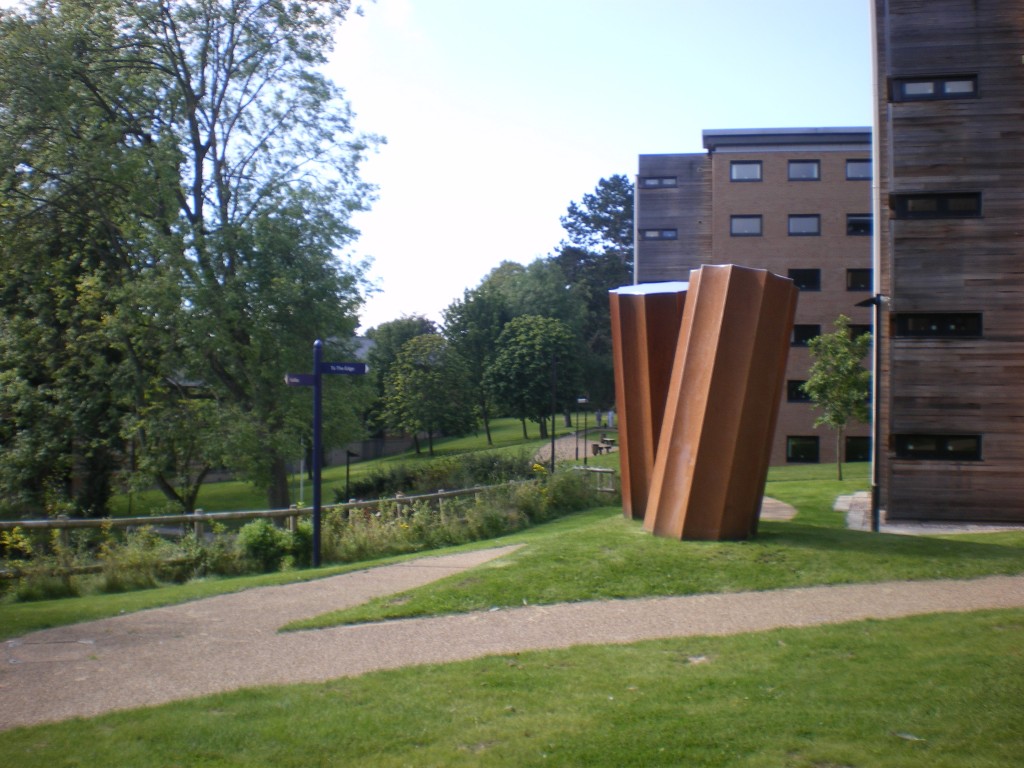
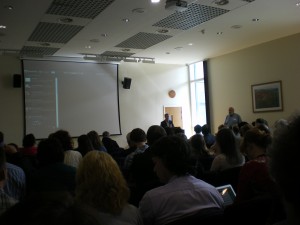 Les trois ‘keynote speakers‘ représentent en quelque sorte cette répartition: le Professeur Andrew Prescott, Head of Department, Digital Humanities, King’s College London, Professeur Lorna Hughes, University of Wales Chair in Digital Collections, National Library of Wales, et Professeur Philip Ethington, Professeur of History & Political Sciences, University of Southern California, Co-Director USC Center for Transformative Scholarship.
Les trois ‘keynote speakers‘ représentent en quelque sorte cette répartition: le Professeur Andrew Prescott, Head of Department, Digital Humanities, King’s College London, Professeur Lorna Hughes, University of Wales Chair in Digital Collections, National Library of Wales, et Professeur Philip Ethington, Professeur of History & Political Sciences, University of Southern California, Co-Director USC Center for Transformative Scholarship.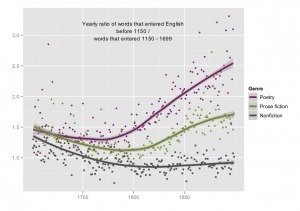
 Leigh Garrett, Marie-Thérèse Gramstadt (University for the Creative Arts, Farnham) ‘KAPTUR : Examining the importance & effective management of research data in the visual arts’; Michael John Goodman (Cardiff) ‘Art to Enchant: The Creation of a Digital Archive’; Smiljana Antonijevic et Sally Wyatt (Royal Netherlands Academy of Arts & Sciences), Monica Bulgr et Eric Meyer (Oxford Internet Institute) ‘Digital Humanities in Practice’; Erin Snyder (Oxford) ‘An Institutional Framework for Digital Humanities: An Alternative to the DH Centre’; Anouk Lang (Strathclyde) (Mapping Miss Mansfield: Using digital tooks to explore the role of place in the work of Katherine Mansfield and Witi Ihimaera’; Patricia Murrieta-Flores, David Cooper, Ian Gregory (Lancaster) ‘Spatial Humanities: Exploring and Analyzing Texts within a GIS environment’; Paul Rayson, Alistair Baron, Andrex Hardie (Lancaster) ‘Which Lancaster do you mean? Disambiguation challenges in extracting place names for Spatial Humanities’; Simon Tanner (King’s College London) ‘New Approaches to Measuring the Impact of the Digital Humanities’, Jonathan Blaney ‘The Citation Problem in the Digital Humanities’; Max Kemman, Martijn Kleppe, Stef Scagliola, Renske Jongbloed (Erasmus University Rotterdam) ‘Mapping the use of digital sources amongst humanities scholars in the Netherlands’; Mel Evans (Birmingham) ‘Multiple Readings from the same page: exploring options for digitized manuscripts’; Tobias Schweizer, Ivan Subotic, Lukas Rosenthaler (Basel) ‘Buidlding Digital Editions on the basis of a Virtual Research Environment’; Jennifer Stertzer (Virginia) ‘Working with the Financial Records of George Washington: Data and Databases’.
Leigh Garrett, Marie-Thérèse Gramstadt (University for the Creative Arts, Farnham) ‘KAPTUR : Examining the importance & effective management of research data in the visual arts’; Michael John Goodman (Cardiff) ‘Art to Enchant: The Creation of a Digital Archive’; Smiljana Antonijevic et Sally Wyatt (Royal Netherlands Academy of Arts & Sciences), Monica Bulgr et Eric Meyer (Oxford Internet Institute) ‘Digital Humanities in Practice’; Erin Snyder (Oxford) ‘An Institutional Framework for Digital Humanities: An Alternative to the DH Centre’; Anouk Lang (Strathclyde) (Mapping Miss Mansfield: Using digital tooks to explore the role of place in the work of Katherine Mansfield and Witi Ihimaera’; Patricia Murrieta-Flores, David Cooper, Ian Gregory (Lancaster) ‘Spatial Humanities: Exploring and Analyzing Texts within a GIS environment’; Paul Rayson, Alistair Baron, Andrex Hardie (Lancaster) ‘Which Lancaster do you mean? Disambiguation challenges in extracting place names for Spatial Humanities’; Simon Tanner (King’s College London) ‘New Approaches to Measuring the Impact of the Digital Humanities’, Jonathan Blaney ‘The Citation Problem in the Digital Humanities’; Max Kemman, Martijn Kleppe, Stef Scagliola, Renske Jongbloed (Erasmus University Rotterdam) ‘Mapping the use of digital sources amongst humanities scholars in the Netherlands’; Mel Evans (Birmingham) ‘Multiple Readings from the same page: exploring options for digitized manuscripts’; Tobias Schweizer, Ivan Subotic, Lukas Rosenthaler (Basel) ‘Buidlding Digital Editions on the basis of a Virtual Research Environment’; Jennifer Stertzer (Virginia) ‘Working with the Financial Records of George Washington: Data and Databases’. et The Edge, complexe de salles, de cafétaria, bar et restaurant, a permis à tous les participants de faire connaissance et de partager leurs expériences et leurs interrogations pendant les ateliers et lors des pauses. Le prochain congrès se tiendra en 2014 et s’il tient les promesses du premier sera certainement aussi riche attirant encore plus de collègues qui travaillent dans le secteur des humanités numériques.
et The Edge, complexe de salles, de cafétaria, bar et restaurant, a permis à tous les participants de faire connaissance et de partager leurs expériences et leurs interrogations pendant les ateliers et lors des pauses. Le prochain congrès se tiendra en 2014 et s’il tient les promesses du premier sera certainement aussi riche attirant encore plus de collègues qui travaillent dans le secteur des humanités numériques.



 permet d’espérer que le projet est non seulement prometteur au niveau de la communauté scientifique française mais aussi au niveau international.
permet d’espérer que le projet est non seulement prometteur au niveau de la communauté scientifique française mais aussi au niveau international. 

 de l’ouvrage
de l’ouvrage  auteur chinois, Jiang Rong, et d’un auteur malais, Pramoedya Ananta Toer.
auteur chinois, Jiang Rong, et d’un auteur malais, Pramoedya Ananta Toer. les deux oeuvres, à différents degrés, sont représentatifs d’itinéraires de résistance contre un pouvoir central et oligarchique, et reflètent différentes facettes de la périphérie, des marges : peuple mongol nomade colonisé dont l’habitat et la culture disparaît sous la pression démographique de la Chine du sud dans le premier, femmes en souffrance, romans composés en prison pour l’autre, qui peut être comparé sous plusieurs aspects à un Solzhenitsyn malais.
les deux oeuvres, à différents degrés, sont représentatifs d’itinéraires de résistance contre un pouvoir central et oligarchique, et reflètent différentes facettes de la périphérie, des marges : peuple mongol nomade colonisé dont l’habitat et la culture disparaît sous la pression démographique de la Chine du sud dans le premier, femmes en souffrance, romans composés en prison pour l’autre, qui peut être comparé sous plusieurs aspects à un Solzhenitsyn malais. 


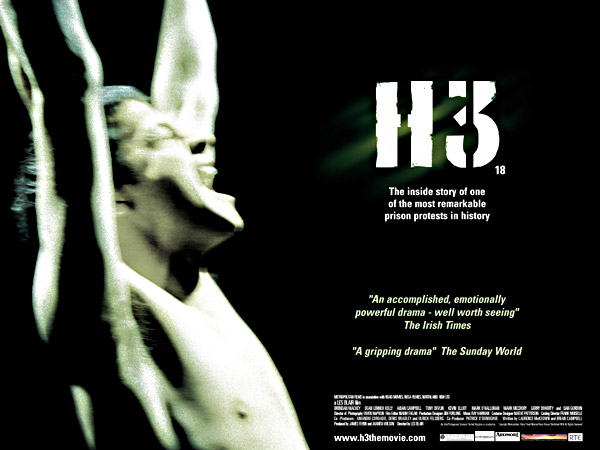
 5 rue de l’école de médecine, 75006 Paris, organisée par Anémone KOBER-SMITH du Centre de Recherche
5 rue de l’école de médecine, 75006 Paris, organisée par Anémone KOBER-SMITH du Centre de Recherche


 La Nouvelle République, 9 septembre 2011.
La Nouvelle République, 9 septembre 2011.  En
En